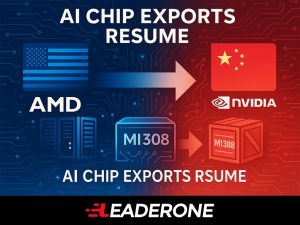
Infographic showing AMD MI308 and NVIDIA H20 AI chip exports from the U.S. to China as trade resumes.
AMD MI308 China export is back on track. Advanced Micro Devices (AMD) recently announced plans to restart shipments of its MI308 artificial intelligence (AI) chips to China. This comes after receiving assurances from the U.S. Commerce Department. License applications for these products will now move forward for review. This mirrors a similar recent development with NVIDIA’s H20 AI chips. The move signals a notable shift in U.S. policy regarding AI chip sales to China.
Navigating Export Controls: The MI308’s Role
The MI308 is an AI accelerator. AMD specifically designed it for the Chinese market. It aims to comply with U.S. export control rules. These rules became stricter over national security concerns. Earlier restrictions had affected AMD’s revenue. The company previously estimated a loss of up to $800 million due to these controls.
The MI308, like NVIDIA’s H20, offers strong AI capabilities. However, its specifications are tailored to fall below the performance thresholds that trigger tighter U.S. export restrictions. This allows it to serve the Chinese market legally.
Why This AMD MI308 China Export Development Matters
The resumption of AMD MI308 China export holds significant implications:
- Market Re-entry: This move allows AMD to regain access to a crucial growth market. China remains a key region for AI chipmakers.
- Revenue Recovery: Both AMD and NVIDIA faced substantial revenue impacts from the earlier restrictions. Resuming shipments could help recover a significant portion of these losses.
- Strengthening Supply Chains: It provides Chinese AI developers with a vital supply of compliant, high-performance chips. This reduces reliance on a single source.
- Policy Evolution: The decision marks a shift in the U.S. approach. It aims to balance export controls with trade and innovation. U.S. officials suggest this allows domestic tech to compete. It also aims to limit China’s ability to develop its own alternatives.
- Industry Competition: While Chinese companies like Huawei are developing their own AI chips, the return of AMD and NVIDIA offerings adds to market competition and choice.
The Road Ahead for AI Chips in China
The process involves license applications moving forward for review. AMD plans to resume shipments once these approvals are secured. This development comes amid ongoing U.S.-China trade discussions. Both AMD and NVIDIA have expressed support for this policy shift.
The ability for companies like AMD to resume MI308 China export is a critical step. It helps stabilize the global semiconductor supply chain. It also supports the continued growth of AI development within China, albeit with tailored hardware. The situation highlights the dynamic nature of international trade and technology policy.
